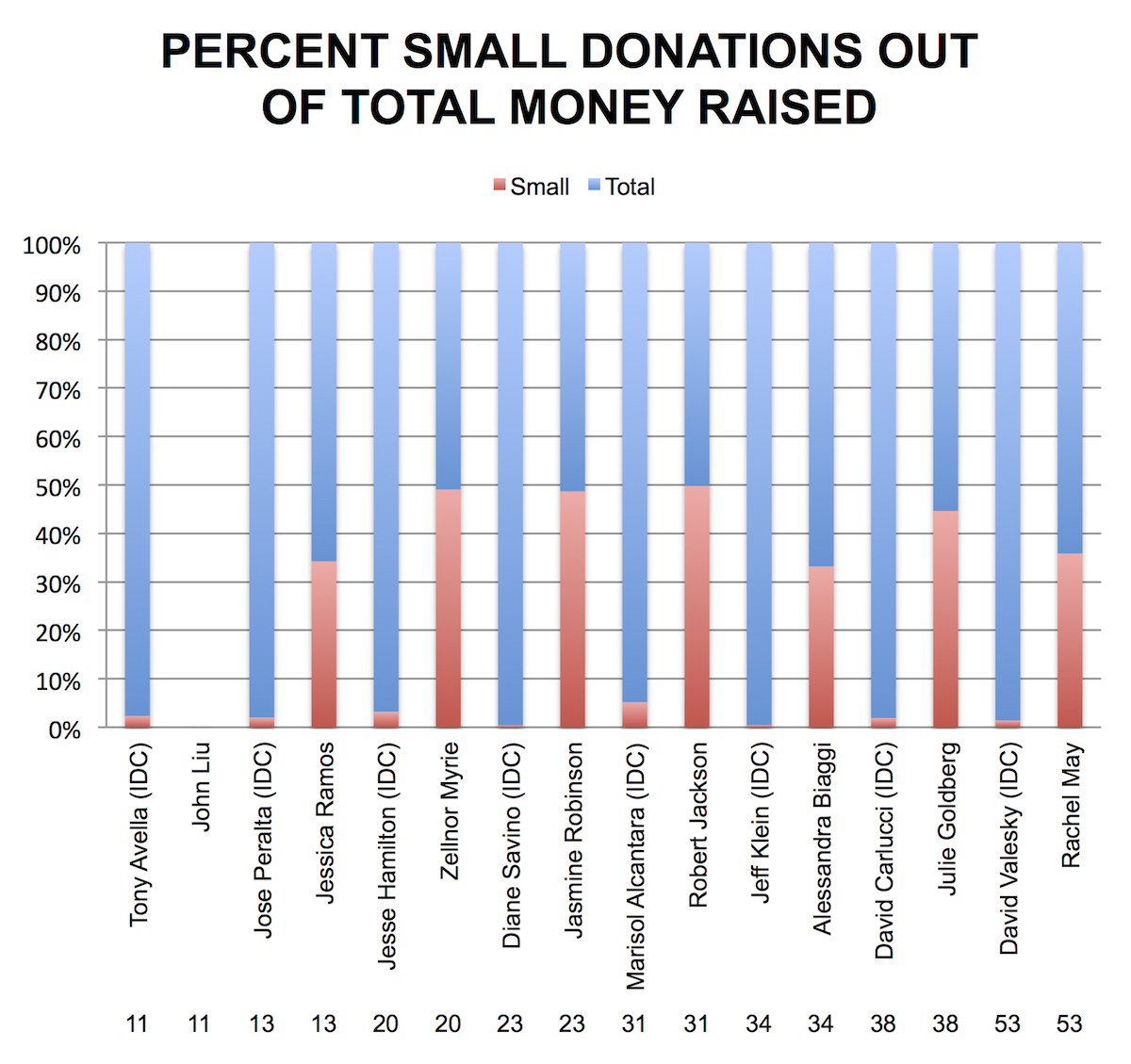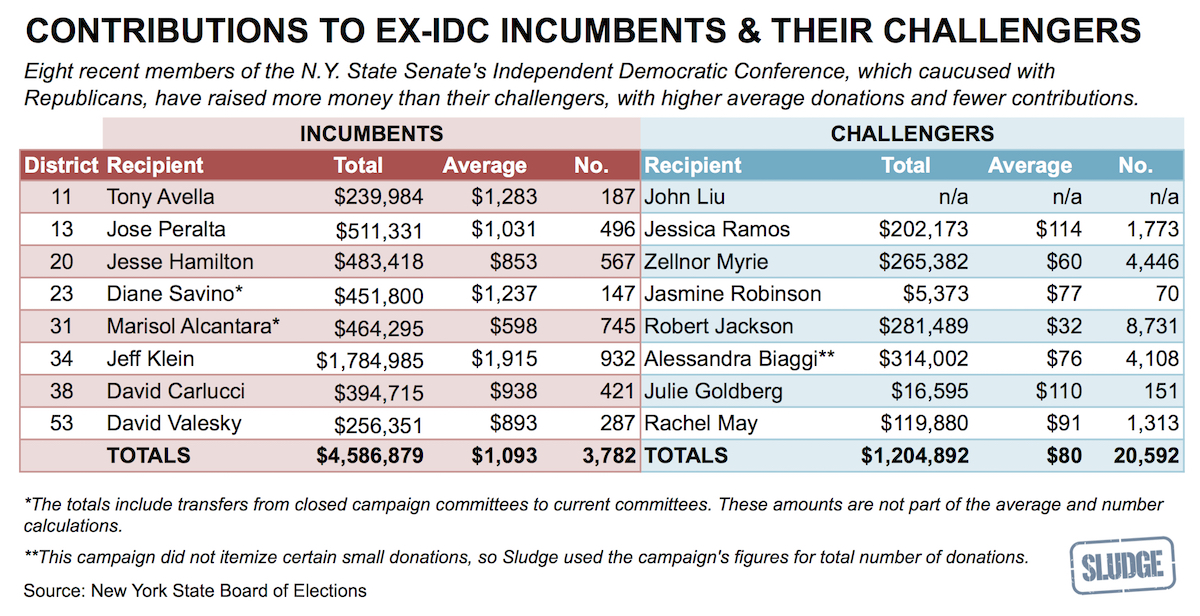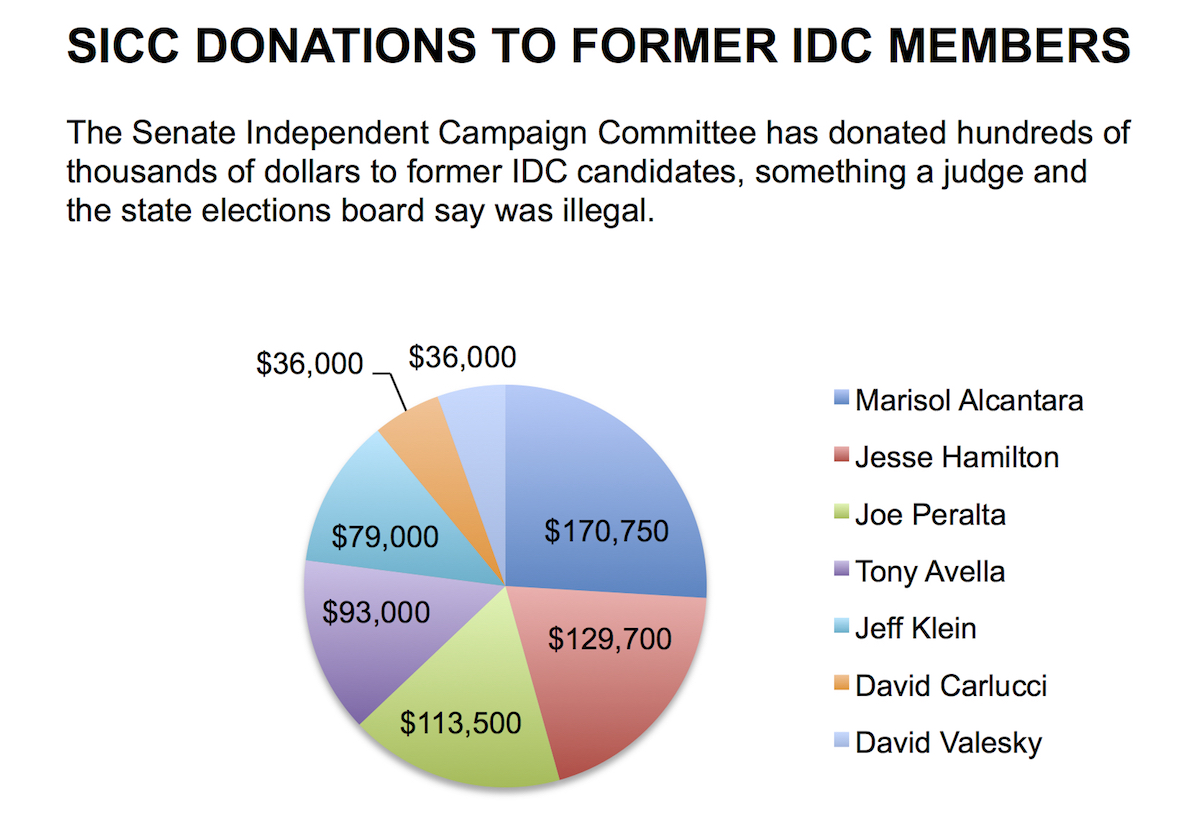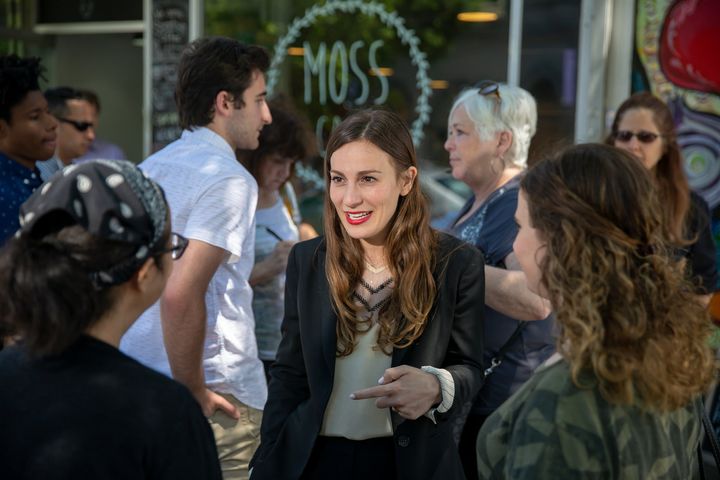A crop of New York State Senate hopefuls is knocking on the door of the chamber, hoping to unseat eight Democrats who recently left the powerful Independent Democratic Conference (IDC), a group that aligned with Republican senators, effectively giving the GOP a majority and helping stall legislation concerning single-payer healthcare, LGBT rights, election and campaign finance reform, reproductive health and tenant protections.
While the ex-IDC incumbents accept large sums from corporations and LLCs, many of their challengers have pledged to reject corporate money. With the help of extensive outreach operations, most IDC challengers have been able to raise lots of small donations from individuals and, as a result, have average contribution amounts far lower than those of the incumbents they’ll face in the September primary.
So far this cycle, the incumbents raised, on average, just 2.1 percent of their campaign cash from small donations of $200 or less. Their challengers, by contrast, averaged 42.2 percent of their fundraising totals from small donations.

District 53
Challenger Rachel May “first started thinking about running a year ago, out of deep frustration about the IDC and [incumbent David] Valesky’s role as a co-founder and leader of the group,” she told Sludge. “The idea that they were empowering Senate Republicans in the Trump era to block crucial priorities like election reform, protections for immigrants, and the Reproductive Health Act was just insupportable.”
May—who is vying for the Senate district that includes the city of Syracuse and surrounding areas—has raised nearly $120,000 from 1,313 contributions with an average donation size of $91. All but 10 of these donations came from individuals, amounting to 94 percent of the money raised.
“We have no interest in taking money from groups that fund the same old politics-as-usual in Albany,” she said. “We are not accepting money from LLCs or corporate PACs.” (May’s original campaign finance filings showed two corporate donations. The campaign said one was returned and the other had been misclassified.)
In stark contrast, only 57 individual donations went towards incumbent Valesky’s total of $256,000 in receipts, accounting for just 10 percent of that total. Corporate, LLC and PAC donations made up 73 percent of his contributions.
Speaking for the ex-IDC incumbents, who did not wish to comment individually, spokesperson Barbara Brancaccio told Sludge, “Each of the State Senate Democrats who are facing primary challenges are proud to receive campaign donations from businesses, groups and individuals from within their districts, where they all have overwhelming support. All of these candidates have delivered landmark legislation for workers and families, and unprecedented funding for their communities, which is why they will win reelection in September.”
Valesky’s low number of individual donors, May said, “reflects how little he cares about grassroots engagement, while our total number of donations and average donation reflect the way that we engage with voters and talk about issues.”
May says her campaign is feeling good about its prospects and those of fellow challengers.
“When we’re out knocking doors and making phone calls, the response we get from voters is tremendous…What we’re hearing is that New Yorkers are tired of the status quo,” May said. “The whole slate of IDC challengers is working together, and that has helped fuel a lot of progressive energy state-wide. It’s a diverse, energetic, impressive group, and I’m proud to be a part of it.”
The challenger continued, “I’m running to pass legislation that addresses big, systemic issues like health care for all and a just transition to clean energy, and to offer an antidote to the soft corruption and cynicism that engendered the IDC’s grotesque perversion of our democracy.”
Several other IDC challengers have similar, small-donor funded campaigns, while their opponents have raised more money from far fewer donors. For the 2017-18 election cycle, the incumbents so far have a combined average donation of $1,079—including large donations from the IDC’s potentially illegal fundraising arm, the Senate Independence Campaign Committee (SICC)—while contributions to their challengers averaged $80.

Using data from the New York State Board of Elections, Sludge calculated average donations of the ex-IDC incumbents and their challengers by including all contributions, including in-kind donations—from individuals, political action committees (PACs), corporations and LLCs, as well as in-kind donations—and subtracting refunded donations.
District 20
Lawyer, Brooklyn native and progressive Zellnor Myrie is running to unseat former IDC member Jesse Hamilton in the Senate’s 20th District in central Brooklyn. With endorsements from the likes of the Bernie Sanders-inspired Our Revolution, the Working Families Party and New York Communities for Change, Myrie has taken in about $265,000 via 4,446 donations during the 2017-18 election cycle, with 93 percent of that total coming from individuals. His average donation is around $60, and 49 percent of the total money raised came in the form of small contributions.
In contrast, Myrie’s opponent, Hamilton, has raised $483,000 from far fewer donations, with an average contribution of $853.
“Our campaign is being powered by thousands of small-dollar donors, and we wouldn’t have it any other way,” said Myrie in a press release. “By refusing to accept money from the real estate industry, corporate PACs, and other GOP backers, we’re showing the world where our loyalty lies—with working families in need of real Democratic representation.”
Hamilton, the protege of Brooklyn Borough President Eric Adams who was elected in 2014, deflected to the IDC days before the 2016 election. The IDC had been courting Hamilton since 2014, contributing to his campaign via an IDC PAC.
District 31
Former New York City Council member Robert Jackson is looking to unseat ex-IDC member Marisol Alcantara in District 31, which encompasses the heavily Latino area of Washington Heights, as well as Inwood, slivers of Harlem and the Upper West Side. Of all the candidates in the eight races involving ex-IDC members, Jackson received the most contributions—8,731, according to N.Y. State Board of Elections data. Jackson also has the lowest average contribution: $32.
Campaign spokesperson Richard Fife told Sludge, “Robert Jackson is building a people-powered campaign ready to bring the progressive Democratic leadership needed to finally fully fund our public schools, pass New York’s single payer health plan, reform our loophole-ridden, landlord-written rent laws and protect LGBT rights, women’s rights and immigrant rights.” Regarding Jackson’s numerous small donations, Fife said, “We believe this is a far healthier way to fund a campaign than the big money special interests contributing to the incumbent.”
Jackson received numerous, often recurring small donations, including almost 700 contributions of $1. While no single donor gave tiny donations on the scale of one donor to Gov. Andrew Cuomo, who gave the governor’s campaign 69 mostly $1 donations, these tiny donations significantly lowered his average contribution amount.
Incumbent Alcantara, a longtime union organizer, has the highest number of donations of the ex-IDC members (747) and the lowest average donation ($597), but these statistics still contrast significantly with her opponent’s.
Jackson was defeated by Alcantara in the crowded 2016 Democratic primary by 533 votes. In 2014, Jackson was defeated by now-Congressman Adriano Espaillat by more than 1,400 votes.
District 34
Ex-IDC leader Jeff Klein faces a challenge from lawyer and Hillary Clinton campaign alumna Alessandra Biaggi. In his leadership role, Klein has received by far the most funding of any candidate in the eight elections for ex-IDC incumbents, at close to $1.8 million. His average contribution, $1,915, is also the highest. Still, his 932 donations are less than one-quarter of the contributions that Biaggi’s campaign claims (4,108).
Roughly 70 percent of the money raised by Klein’s campaign came from corporate, LLC and PAC donations, while 10.4 percent of Biaggi’s funds came from those sources. Klein raised a mere 0.48 percent of his total ($8,553) from small donors. (33.2 percent of Biaggi’s funds came from small donors.)
The Biaggi campaign did not itemize certain small donations, nor did it include the total number of donations in these unitemized sums, so Sludge was forced to use numbers provided by campaign spokesperson David Neustadt. Several candidates have used different methods to record donations made by donors who gave no more than $99 in total to the candidate. A N.Y. Board of Elections rule allows campaign treasurers to lump such contributions into larger unitemized amounts, though most include the number of donations that make up these amounts in their filings.
Biaggi’s total amount raised so far is $314,000, with an average donation of $76, according to the campaign’s contribution numbers. The challenger, who is accepting corporate and LLC donations, said in a press release, “I’m grateful to everyone who contributed to help work for a true-blue progressive Democratic State Senate that will fight for health care, affordable housing, women’s reproductive rights, access to college education, ethics in government and all the other issues held up by Republican control. With broad, grassroots support, we can win.”
The Biaggi campaign listed 24 donations of $0 and told Sludge that these represented the second name listed on joint donation checks. “If there are two names on a check, husband and wife, the rule is to list each one separately but only include the dollar amount by the first name,” said Neustadt.
Other Districts
Worker advocate Jessica Ramos is challenging incumbent Jose Peralta for his District 13 seat, which includes Corona, Elmhurst and Jackson Heights. Ramos, with endorsements from the Working Families Party, Our Revolution and Cynthia Nixon, has raised $202,000 so far from 1,773 contributors for an average donation of $114. Peralta, by contrast, has received nearly $510,000, with an average donation of $1,029.
In District 38, librarian Julie Goldberg is trying to unseat ex-IDC member David Carlucci, who had been a member of the IDC since he entered into the senate in 2011. Over the six weeks since declaring for office, Goldberg accepted around $16,500, with an average contribution of $110, while Carlucci’s average was $867. “We have an enthusiastic grassroots donor base, and our fundraising is only just getting started, as the campaign kicked off on May 31st,” Goldberg told Sludge. “Part of our fundraising success in the first six weeks has come from joint events with the other IDC challengers, which raise the profile of our campaign and attract donations.”
Diane Savino, the incumbent senator in District 23, has received only 7 percent of her fundraising total from individuals and just $750 in small donations, a figure that does not factor in $270,000 that Savino transferred from a previous, closed campaign committee. Her challenger, Jasmine Robinson, raised the smallest total (close to $5,400), with an average donation of $77.
Perennial New York candidate John Liu announced his challenge to District 11 incumbent Tony Avella on July 13 and doesn’t have any contribution information available, according to Liu’s communications director. Liu, the former New York City Comptroller, unsuccessfully challenged Avella in 2014. Avella has the second-highest average contribution, $1,283, of the ex-IDC group.
Illegal Contributions?
The former IDC senators have a huge fundraising advantage over their challengers: big donations from the controversial coffers of the Senate Independence Campaign Committee (SICC).
The SICC had been acting as a party committee, allowing it to transfer unlimited amounts of money to IDC members, but a state Supreme Court justice ruled in June that the arrangement was illegal. The justice said the independent Democrats were not entitled to a party’s “free speech protections.” She said Independence Party officials, not Klein, should have controlled the account.
Therefore, while Klein ran the SICC, the committee far exceeded this election cycle’s non-family contribution limits for State Senate: $7,000 for the primary elections and $11,000 for the general.
Despite breaking up the IDC in April and rejoining mainline Democrats, ex-members have continued to accept large checks from the SICC and stand behind the committee. “The SICC is a lawful, compliant campaign committee and will continue to support candidates of their choosing,” Brancaccio told Sludge.
On July 24, the Board of Elections’ enforcement division called on ex-IDC members to return potentially hundreds of thousands of dollars in excessive SICC contributions they’ve raked in since 2016.
In 2016, Alcantara received the bulk of SICC’s funds, but this year, the committee has donated a total of $658,000 to seven of the eight ex-IDC members. Alcantara has gotten the most so far—nearly $171,000—but Hamilton has received close to $130,000 and Peralta has taken in roughly $114,000.

On behalf of SICC, Brancaccio said, “This is an enforcement counsel unwilling to abide by the decision of the court and the counsel to the committee will be asking the court to sanction her if she persists in distorting the judgement of the court. Her release of this letter to the press in the middle of a heated political campaign is an abuse of her powers.”
Top Donors
Other top donors to the ex-IDC incumbents include real estate interests Real Estate Board PAC ($76,00 total) and the New York State Association of REALTORS ($26,700). The NRCC NY Non-Partisan Political Education Committee, which represents carpenters and also donates to the SICC, contributed $27,500 to the ex-IDC members. Other large donors were lawyer David Rich ($60,300) and the New York State Correctional Officers and Police Benevolent Association PAC ($27,850).
Pro-charter school groups New Yorkers for Putting Students First ($26,500) and Great Public Schools ($25,500) also gave big, while Voice of Teachers for Education, representing the NYSUT teachers’ union, gave $23,200.
The challengers took relatively little PAC money, but multi-candidate campaign committee No IDC NY is their largest combined contributor, giving $29,355 this cycle. 32BJ SEIU, a services workers’ union, donated a total of $14,000, and Tenants PAC gave $8,000.
Additional Senate candidates are rejecting corporate money. Julia Salazar, a young leftist who has received endorsements from the Democratic Socialists of America, Make the Road Action, gubernatorial candidate Cynthia Nixon and U.S. Rep. Nydia Velázquez (D-N.Y.), received $120,000 in contributions, with no money coming from corporations or LLCs, and an average contribution of roughly $55. Her opponent Martin Dilan has an average donation of roughly $700 this cycle. In 2016, Dilan received financial support from SICC, although he was not an IDC member.
The complacency of the State Senate is a direct result of campaign contributions from the ultrawealthy, developers, and other special interests.
— Julia Salazar for State Senate (@SalazarSenate18) July 17, 2018
I don't take developer dollars. I can't be bought.
The only special interests I'm fighting for are yours. https://t.co/xwksX8VIq6
“Our policy is to reject all contributions from corporations and real estate interests,” Salazar Deputy Campaign Manager Michael Kinnucan told Sludge.
“The reason is simple: we want to be accountable to our constituents and the progressive movement, not landlords and corporations,” Kinnucan said. “We think the contrast with our opponent is crystal clear: our campaign is supported by grassroots donors, while his is supported by wealthy lobbyists and special interests.”
This story has been updated to reflect the latest campaign finance numbers for Jeff Klein.



